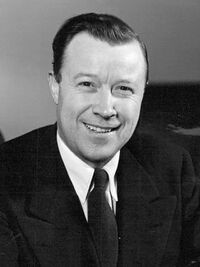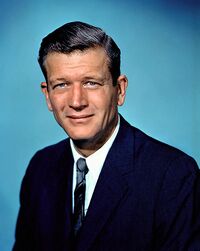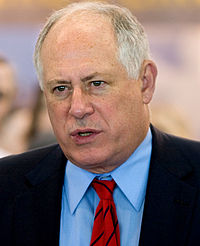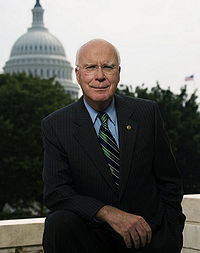List of leaders of the United Commonwealth
Throughout the history of the United Commonwealth since the Continental Revolutionary War, the country has often not possessed a de jure singular leader. Although the country has had numerous constitutions and an evolving government structure throughout its existence, the United Commonwealth has consistently maintained a policy of official collective leadership, whereby the head position of each branch of government is divided among a council of several officials, such that no one person could be said to head the state or government. However, in practice the United Commonwealth's branches of government have almost always produced a de facto leader who formally or informally presides over council policy. The individual who is said to conduct the most influence over these branches and therefore effectively control the nation as a whole is considered the de facto leader of the country, or the "paramount leader". This individual may be in command of the head of state or head of government in the United Commonwealth, but not necessarily so. Under the current constitution, which has been in effect since 1982, the Premier is the chairperson of the Council of People's Commissars (historically also known as the Council of Ministers or the Cabinet), which acts as the head of government, and the President is the chairperson of the Presidium to the National People's Congress, which acts as the head of state. Historically the holder of one or more of these titles was also often the General Secretary of the Continentalist Party, which is the de facto highest position in the country's sole-governing political party, as head of the Secretariat of the Central Committee of the Continentalist Party.
Historically, the General Secretary was often consequently the head of the nation due to the importance of the party leadership position. In the ideology of Aeneas Warren, the United Commonwealth was to be headed by a collegiate body of the vanguard party, as espoused by such thinkers as Vladimir Lenin in What Is to Be Done?, or by Isaiah Landon in Society and Statelessness. Warren envisioned the nation as being governed by collective leadership with no one person acting as supreme leader, and planned to implement such a system following the results of the 1924 general election, which he predeceased. After a brief period of rule under this system known as the First Triumvirate, this vision was reversed under the rule of Seamus Callahan and a consolidation of power occurred in the late 1920s. The post of General Secretary of the Continentalist Party became synonymous with that of leader of the United Commonwealth, and later the Secretariat was consolidated into effectively a post of one person. This placed Callahan in direct control over the Continentalist Party and the United Commonwealth government, allowing him control over party membership as well as government posts. After Callahan's death in 1947 many of his governmental practices were reversed during the era of "Decallahanization", and the country was became formally governed by a triumvirate for the second time for a period of three years. During the Mid-Century Crisis that followed, the debate over decentralization of political power versus the supremacy of a paramount leader polarized the party's discourse. During the relaxing of restrictions in the decades of the Cold War, the fight for democratization and accountability in the government became commonplace. Although he had consolidated effect control over the government under the guise of wartime necessity, Lysander Hughes became supportive of a legal separation of party and presidency in the final months of his life.
The United Commonwealth's 1960 constitution increased public representation in government and in electing upper leadership, leading to the highly popular but controversial presidency of Rupert Gardner, which lasted from 1961 to 1968. However, his presidency sparked a conservative backlash from the old elite of the Continentalist Party who had retained control over the Secretariat, leading to the direction intercession of the General Secretary. A period of a little over a decade transgressed, known often as the Era of Stagnation, in which a series of General Secretaries governed as head of the country largely without a popularly elected mandate. This period saw the further escalation of the dissident Democracy Movement, leading to such events as the Time Square Protests of 1979. Popular support and the implementation of the 1982 constitution allowed for the rise of a strong presidency in Simon Valure and Jackson Rothko. Since the beginning of the 21st century the presidency has been selected in a similar capacity to that of a prime minister in a parliamentary system, requiring the support of a majority of the National People's Congress.
History
Aeneas Warren (1871–1922) served as the de facto leader of the Continentalist Party from its inception in 1911. During the Continental Revolutionary War, he served as leader of the Continentalist faction in his capacity as General Secretary of the Continentalist Party, and as the chairman of a Executive Committee of the Chicago People's council, which eventually evolved into the Council of People's Commissars. Warren presided over the creation of the Provisional Socialist Authority of the United Commonwealth in 1917. Following the end of the revolutionary war and the establishment of the modern United Commonwealth through the Union Treaty, on 1 May 1921 Warren was declared the first provisional president of the country and the first premier, effectively giving him control over both the executive and legislative branches. His intention remained to separate these offices into collective bodies following the 1924 General Election, however, Warren died on 17 September 1922 before these plans could be realized.
A brief succession crisis took place after the unexpected death of Warren in which no sole paramount leader could be said to have existed. The first person to make an attempt to succeed Warren, William Z. Foster (1881–1955) briefly acted in command of government functions in Chicago from 17 to 23 September. Foster was previously promoted to the office of Vice President of the newly created Presidium by Warren, the implication being that Foster was Warren's chosen regent. Foster made an unsuccessful bid to become acting president in the leadup to the 1924 general election, but was bypassed by Warren's successor as General Secretary, Seamus Callahan, instead being compelled to cede power to a trio of highly respected party officials as a compromise between the "Fosterites" and "Callahanites". This trio, known as the "First Triuvmirate", consisted of Fosterite Jim Maurer (1864–1944), Foster-leaning moderate Morris Hollquit (1869–1933), and Callahanite Meyer London (1860–1926), and was intended to serve as an interim government until the 1924 election, if not a model for future leadership in the country. This arrangement lasted over a period of just over two months, and is thus known as the “Seventy Days”.
Seamus Callahan (1875–1947) became paramount leader in late 1922 or early 1923 and remained in this position until his death. Orchestrating the collapse of the First Triuvmirate from power, Callahan arranged for the appointment of loyal ally Coleman Mueller (1870–1948) as head of the Presidium. Largely a puppet of Callahan, Mueller wielded control over the legislature officially until the election of Callahan as president himself in 1924. Through the orchestration of the Waldmann Plot, Callahan outmaneuvered Foster and his ally Zhou Xinyue to become the uncontested leader of the country. Callahan would go on to become the longest reigning leader in the history of the United Commonwealth, serving over 24 years as leader. During this time he oversaw Continental involvement in the Great War (1932–1938), lead the country during the onset and early years of the Cold War, and further consolidated rule around himself by taking command of the premiership after 1932, among other offices, and retained a strong grip on power and control over the state even after the end of the Great War in 1938.
After the death of Callahan in 1947, another succession crisis transpired, where opponents of Callahan's government policies sought to reestablish collective rule and decentralize government agencies. Spearheaded by the most influential members of the 18th Secretariat, a "Second Triumvirate" was formed that effectively governed the country from 1947 to 1950. This trio consisted of acting president Jack Tracy (1903–1982), premier John L. Lewis (1880–1950), and People's Commissar for Defense Hoyt Vandenberg (1889–1954). Under their leadership they instituted a reversal of many Callahan-era policies, in what became known as Decallahanization. This group was opposed by a second faction led by Amelia Fowler Crawford (1901–1978), Callahan's designated successor as general secretary. The Second Triumvirate was slowly discredited through national crises such as the Dixecrat Revolution, and also weakened by Lewis' death in 1950 of old age, leading to Crawford becoming paramount leader in 1950. Crawford would remain in power until 1953, when after losing the confidence of the 20th Secretariat in the wake of the Irish Missile Crisis, she resigned her leadership posts. This instituted a peaceful transfer of power to her deputy, Lysander Hughes (1897–1958).
Under Hughes, the United Commonwealth instituted the "New Frontier" outlook, which called for socialist leadership guided by science and reason. He oversaw Continental involvement in the Space Race and the escalation of the Cold War against the Western Bloc. Dying in office in 1958, Hughes was succeeded as president by Elaine Carroll (1900–1981). A less organized "Third Triumvirate" took shape under Caroll, premier Jack Spruance (1904–1979), and others, which ruled the country from 1958 to the start of 1961. This group sought to reform government to give explicit power to the president, and supported the ascension of popularly elected president Rupert Gardner (1908–1968) in 1961. Gardner instituted a period of de-escalation with the Western Bloc and further democratization of Continental leadership. Assassinated in 1968, leadership was retaken by the more conservative Secretariat led by Charles Acker (1884–1972), which stalled reform for fear of destabilization. Under Acker and collegues, nicknamed the Michigan Club, an Era of Stagnation began throughout the 1970s, characterized by the 1979 Times Square protests.














